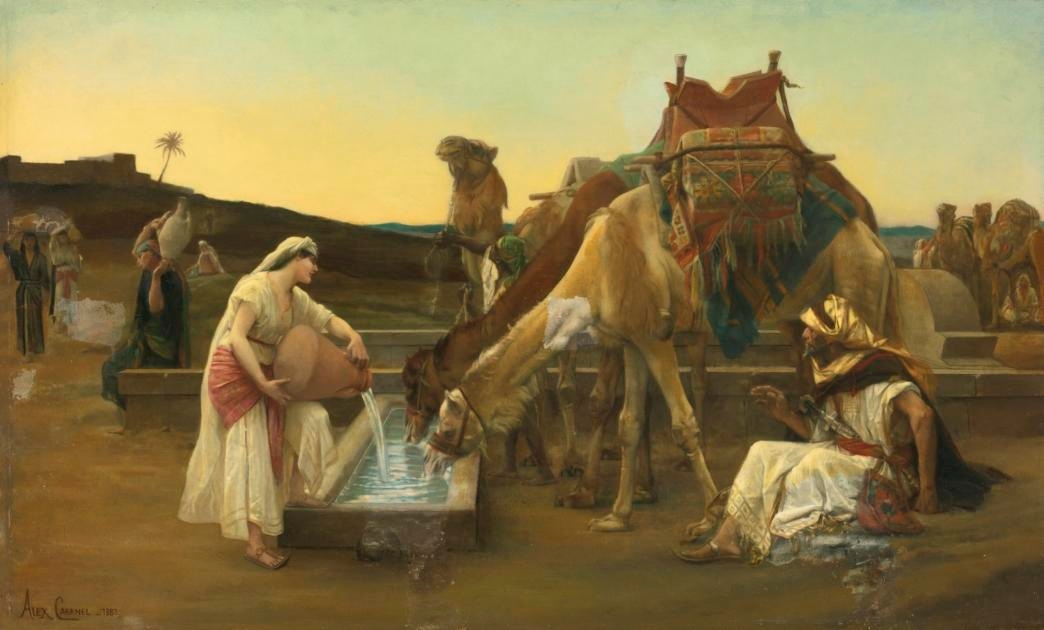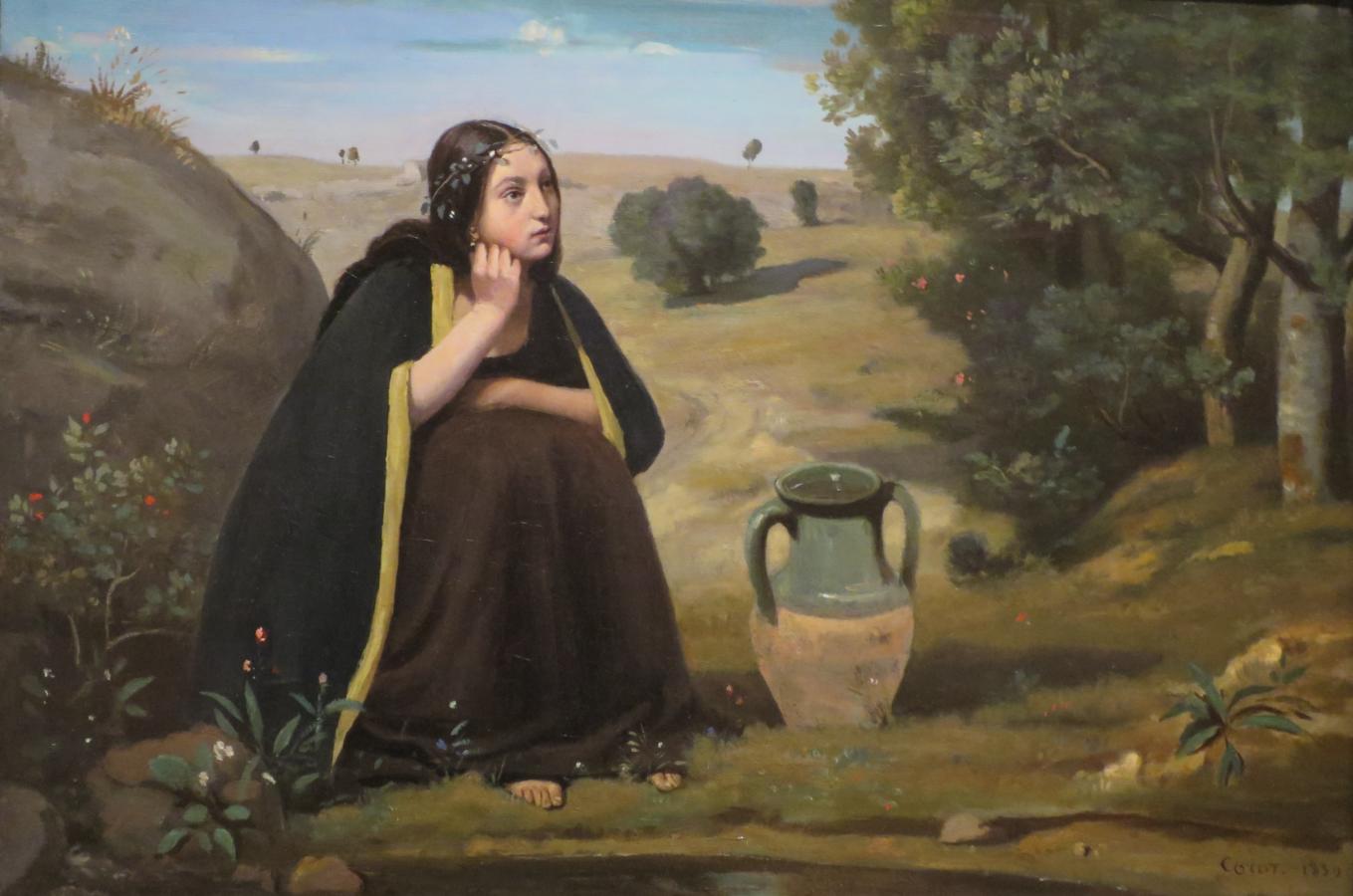It’s never easy to be second, and the Jewish matriarch Rebecca was second in more ways than one. To start, she was the second generation of God’s covenant with the Jewish people — the one that began with her in-laws, Abraham and Sarah. Unlike Abraham and Sarah, Rebecca and her husband Isaac were not the groundbreakers who first forged the covenant, but the next generation inheritors of it. Rebecca was also second in that Isaac, the blood son of Abraham and Sarah, was the direct inheritor of that covenant. She, in contrast, came in to the family and covenant through marriage. And, of course, she was second insofar as she was a woman in the ancient world where blessings and covenants were passed down from father to son. Wives and mothers were essential to this process, but never on par.
But despite being second in all these ways, Rebecca (Hebrew: Rivkah), a woman of many actions and few words, displays extraordinary strength of both body and character, and manages to break the mold and take an active role in shaping her own destiny — and that of her offspring.
According to the Biblical narrative, it is Rebecca’s generosity and strength that bring her into the covenantal family. After the death of Sarah, Abraham determines that the time has come to find a wife for his son, Isaac. Because he wants Isaac to marry someone from his own extended family, he sends his servant, whom commentators identify as Eliezer, back to his birthplace to find a suitable bride. During his journey, Eliezer devises with a test to ensure that he chooses an appropriate bride for Isaac: when he asks a woman for water, the right woman will not only gives him a drink but also water his ten camels. Luckily, Eliezer doesn’t have to search high and low. Upon arriving in Aram Naharaim, Rebecca is the first woman he meets, and she immediately passes the test. This proves her to be not only generous, but exceptionally strong — one thirsty camel can drink 53 gallons of water in minutes!

With your help, My Jewish Learning can provide endless opportunities for learning, connection and discovery.
After they meet at the well, Rebecca takes Eliezer to meet her family and, shortly thereafter, agrees to return to Canaan to marry Isaac. Strikingly, Rebecca’s decision to undertake the journey to Canaan echoes the original journey made by Abraham. Abraham travels from Haran to Canaan after having been commanded by God: lech lecha — “go forth.” Rebecca travels from Aram Naharaim, Abraham’s birthplace, to the same destination. When her family asks her if she agrees to go, she responds: elekh, “I will go,” using language that echoes Abraham’s. Yet, while Abraham received the commandment directly from God, Rebecca chooses to go of her own volition.
Some interpreters have even argued that Rebecca actively chose to marry Isaac, rather than fall into a role that was assigned to her. The Bible tells us that Rebecca was “very beautiful, a virgin whom no man had known.” Most traditional commentators understand this to mean that Rebecca was not only unmarried, but also extremely sheltered; the phrase “whom no man had known” indicates that she kept to her house and did not know any man outside of her family. But a more modern midrash understands this phrase differently: “whom no man had known” refers specifically to the servant Eliezer, who did not know that the moment Rebecca saw him, she understood that he was from Abraham’s family and that he had come to find Isaac a wife. Immediately comprehending the situation, Rebecca began making her way towards the servant. What the servant did not “know” was that Rebecca had consciously agreed to, and even orchestrated the betrothal before he said a word about it.
Rebecca is also the first woman in the Hebrew Bible, and the only one of the matriarchs, to receive a blessing, one that echoes the blessing and promise given to Abraham, which eventually became the birthright passed down from one generation to the next. Before she leaves for her new life with Isaac, her family blesses her: “May you grow into thousands of myriads. May your offspring seize the gates of their foes.” Receiving this blessing marks her as someone who has a central role within the covenantal framework. Perhaps not coincidentally, she is later instrumental in ensuring that God’s covenantal blessing is passed down to the next generation through the correct son.
Rebecca’s strength of body and spirit carries over into her new married life with Isaac. Rebecca is a woman of action, not of words, and this feature of her personality becomes increasingly apparent as time goes on. When she and Isaac struggle with infertility, Isaac prays to God. But once Rebecca becomes pregnant and the pregnancy proves to be unusually difficult, the text notes that Rebecca goes out and seeks God; unlike Isaac who solely prays, Rebecca physically leaves her home in order to connect with God and understand what is happening to her. Additionally, it is a point that is often glossed over, but Rebecca survives a difficult pregnancy carrying twins eons before the arrival of modern medicine. The physical strength that she demonstrates ensures the birth of two nations, Israel and Edom.
Not only does she bring both boys into the world, but Rebecca is instrumental in sealing their respective futures, ensuring that Jacob, her favorite child, receives the birthright blessing that had previously been passed down from Abraham to Isaac. As the older of the twins — and his father’s favorite — Esau is the son who is expected to receive the blessing. But at the moment when the blessing is to be passed down, Rebecca disguises Jacob as Esau. Isaac, who has grown blind in his old age, gives the birthright blessing to Jacob instead of Esau.
Rebecca is a doer, not a talker. Indeed, while the text is explicit in saying that Isaac loved Rebecca, they have very few conversations — and clearly never thoroughly discuss parenting. Her instinct to spring into action and have Jacob trick Isaac into giving him the blessing instead of Esau, rather than discussing the issue with Isaac, demonstrates the less savory results of that aspect of her character. However, while Rebecca may be a flawed figure, she does prove herself to be capable of learning; one of the few conversations that Isaac and Rebecca have takes place after the family crisis of Jacob receiving the birthright blessing instead of Esau. The conversation is not about what recently took place (Rebecca expresses her disapproval of Esau’s wives), but it does indicate that, after seeing the consequences of pure action, she is attempting to open the lines of communication with her husband.
Rebecca may not be the first matriarch, but being second does not stop her from being remarkable in her own right. She is the first person to make the active, conscious choice to join the Jewish people, and her physical and emotional strength helps to ensure their future.
Want to get to know more amazing, complicated, and relatable biblical personalities? Sign up for a special email series here.



